BusinessEurope Headlines No. 2016-36
B20 must lead in supporting trade and investment
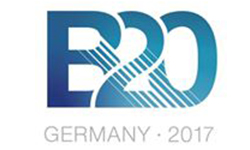
The preparatory work for the B20 German Presidency has started. BusinessEurope President, Emma Marcegaglia, is chairing the Trade & Investment Task Force that had its official kick-off on 3 November. The group will work on concrete recommendations to be presented to G20 leaders next year. As Emma Marcegaglia pointed out “trade and investment act as engines for growth, wealth and innovation in our globalised world”. However, in some regions of the world, including Europe, we are seeing a growing opposition to trade and its benefits are being contested. Moreover, and despite repeated pledges from G20 leaders, protectionist measures are on the rise. All this is contributing to a slowdown in trade and investment flows worldwide. Marcegaglia added “we, the business community, are the advocates for trade and investment in front of G20”. Now, more than ever, trade and investment are key in supporting sustainable growth around the world. As business we need to ensure politicians remain committed to this goal.
Contact: Luisa Santos
Fostering Investment in Smart Industry
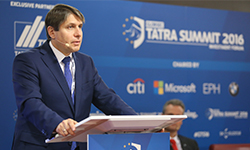 Going digital is not an option but a necessity for Europe. Irrespective of the size, country or sector, the opportunities offered to industry by digital are huge. This message was delivered by Markus J. Beyrer, BusinessEurope’s Director General, at the GLOBSEC Tatra Summit Investment Forum 2016 in Bratislava on 28 October 2016. Speaking in a high-level, Mr Beyrer concluded that: “investment in smart industries will rely on the policies we set in order to foster the digital economy. This is an economy that is in rapid evolution. Legislation that shapes it must reflect its need for that flexibility.” Further details on the conference can be found here.
Going digital is not an option but a necessity for Europe. Irrespective of the size, country or sector, the opportunities offered to industry by digital are huge. This message was delivered by Markus J. Beyrer, BusinessEurope’s Director General, at the GLOBSEC Tatra Summit Investment Forum 2016 in Bratislava on 28 October 2016. Speaking in a high-level, Mr Beyrer concluded that: “investment in smart industries will rely on the policies we set in order to foster the digital economy. This is an economy that is in rapid evolution. Legislation that shapes it must reflect its need for that flexibility.” Further details on the conference can be found here.
Contact: Patrick Grant
CETA-TTIP game over?
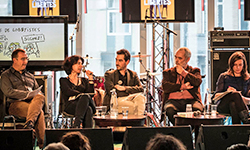 BusinessEurope engaged once more in a debate with CETA and TTIP opponents, on 29 October in the framework of the “Festival des Libertés” in Brussels. The debate was an opportunity to explain why both agreements are good for EU citizens. CETA is the most comprehensive and ambitious agreement ever concluded by the EU both in classical areas like tariffs or services as well as in new areas like sustainability or investment. The agreement strikes a fair balance between increased market liberalisation and the need to safeguard high social, environmental or consumer protection standards. It reaffirms the commitment from Canada and the EU to shape globalisation according to modern and progressive rules taking into account multi-stakeholders’ interests. TTIP is under negotiation but similarly to CETA it fits into a more inclusive generation of trade agreements addressing concerns of citizens while generating new business and market opportunities for companies.
BusinessEurope engaged once more in a debate with CETA and TTIP opponents, on 29 October in the framework of the “Festival des Libertés” in Brussels. The debate was an opportunity to explain why both agreements are good for EU citizens. CETA is the most comprehensive and ambitious agreement ever concluded by the EU both in classical areas like tariffs or services as well as in new areas like sustainability or investment. The agreement strikes a fair balance between increased market liberalisation and the need to safeguard high social, environmental or consumer protection standards. It reaffirms the commitment from Canada and the EU to shape globalisation according to modern and progressive rules taking into account multi-stakeholders’ interests. TTIP is under negotiation but similarly to CETA it fits into a more inclusive generation of trade agreements addressing concerns of citizens while generating new business and market opportunities for companies.
Contact: Luisa Santos
Support for EU ETS Innovation Fund, but make it fit-for-purpose

The Innovation Fund as proposed by the European Commission under the reform of the European emission trading system (EU ETS) is a multi-billion euro funding programme to support the demonstration and commercialisation of innovative low-carbon technologies in industrial sectors. BusinessEurope favors the Innovation Fund and has published a dedicated position paper providing suggestions on its design to allow for an easier handling compared to the previously existing fund called NER300, which was problematic in terms of eligibility criteria and risk sharing. BusinessEurope’s Industrial Affairs Director Alexandre Affre commented: “Innovation is crucial for the competitiveness of EU industry. We therefore support the Commission’s Innovation Fund as a way to stimulate the demonstration and commercialisation of innovative technologies in industrial sectors, provided it’s made fit-for-purpose”. In particular, he added: “Projects should be funded based on their technological excellence, risks should not solely be borne by the game changers and the Fund should be more aligned with the design of Horizon2020 (Europe’s framework programme for research and innovation). It should also be complementary to other support schemes.” BusinessEurope looks forward working together with policy makers on this important topic in the near future.
![]() Contact: Leon de Graaf
Contact: Leon de Graaf
Discussing Tax Policy with the Norwegian Ministry of Finance
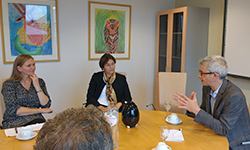 BusinessEurope’s Director of the Economics Department James Watson met with officials from the Norwegian Ministry of Finance on 28 October. James set out BusinessEurope's position on tax proposals such as the Common Consolidated Corporate Tax Base (CCCTB) and Public Country by Country Reporting. He also noted that we should recognize the important role the tax system plays in encouraging investment and driving economic growth.
BusinessEurope’s Director of the Economics Department James Watson met with officials from the Norwegian Ministry of Finance on 28 October. James set out BusinessEurope's position on tax proposals such as the Common Consolidated Corporate Tax Base (CCCTB) and Public Country by Country Reporting. He also noted that we should recognize the important role the tax system plays in encouraging investment and driving economic growth.
Contact: Pieter Baert
BusinessEurope Legal Affairs Committee meets Czech Minister and Senators in Prague
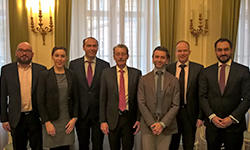 On 25 and 26 October, BusinessEurope and the members of its Legal Affairs Committee gathered in Prague for a meeting hosted by the Czech Confederation of Industry, SPCR. The Committee had an exchange of views on EU priorities for insolvency law, alternative dispute resolution and digitalisation of company law with the Czech Minister of Justice, Robert Pelikán. The Committee also visited the Czech Senate where it met with Senators Jiří Hlavatý and Libor Michálek to discuss entrepreneurship – opportunities and challenges - in the EU.
On 25 and 26 October, BusinessEurope and the members of its Legal Affairs Committee gathered in Prague for a meeting hosted by the Czech Confederation of Industry, SPCR. The Committee had an exchange of views on EU priorities for insolvency law, alternative dispute resolution and digitalisation of company law with the Czech Minister of Justice, Robert Pelikán. The Committee also visited the Czech Senate where it met with Senators Jiří Hlavatý and Libor Michálek to discuss entrepreneurship – opportunities and challenges - in the EU.
Contact: Pedro Oliveira
Push for more digitalisation in EU company law and corporate governance
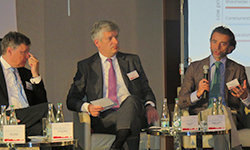 “Digitalisation has been overlooked by policy makers and companies in the fields of corporate governance and company law, especially at EU level. Digitalisation is not a goal as such but a process. Digital tools can help to increase efficiencies in the way companies are managed and communicate with their stakeholders, e.g. with shareholders, consumers, investors and workers.” said BusinessEurope Deputy Director General Jérôme P. Chauvin at the 19th Annual European Corporate Governance Conference in Bratislava on 27 October. He added “BusinessEurope is in favor of measures which increase digitalisation in these areas. Actions need to be diverse in nature, e.g. legislative/non legislative, but also in scope, e.g. EU/national level, and companies should be given the space and time to adapt.”
“Digitalisation has been overlooked by policy makers and companies in the fields of corporate governance and company law, especially at EU level. Digitalisation is not a goal as such but a process. Digital tools can help to increase efficiencies in the way companies are managed and communicate with their stakeholders, e.g. with shareholders, consumers, investors and workers.” said BusinessEurope Deputy Director General Jérôme P. Chauvin at the 19th Annual European Corporate Governance Conference in Bratislava on 27 October. He added “BusinessEurope is in favor of measures which increase digitalisation in these areas. Actions need to be diverse in nature, e.g. legislative/non legislative, but also in scope, e.g. EU/national level, and companies should be given the space and time to adapt.”
![]() Contact: Pedro Oliveira
Contact: Pedro Oliveira
Calendar
 07 November 2016: Eurogroup
07 November 2016: Eurogroup- 08 November 2016: Economic and Financial Affairs Council
- 08 November 2016: US presidential elections
- 07-18 November 2016: COP 22, Marrakech